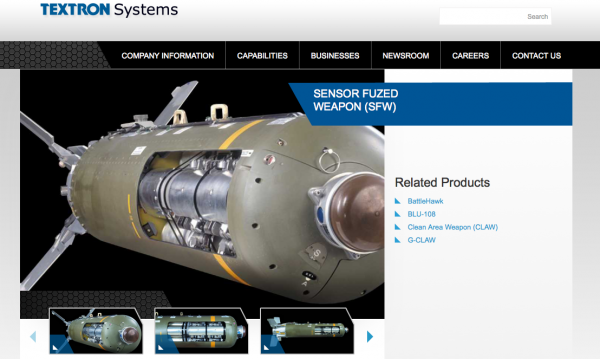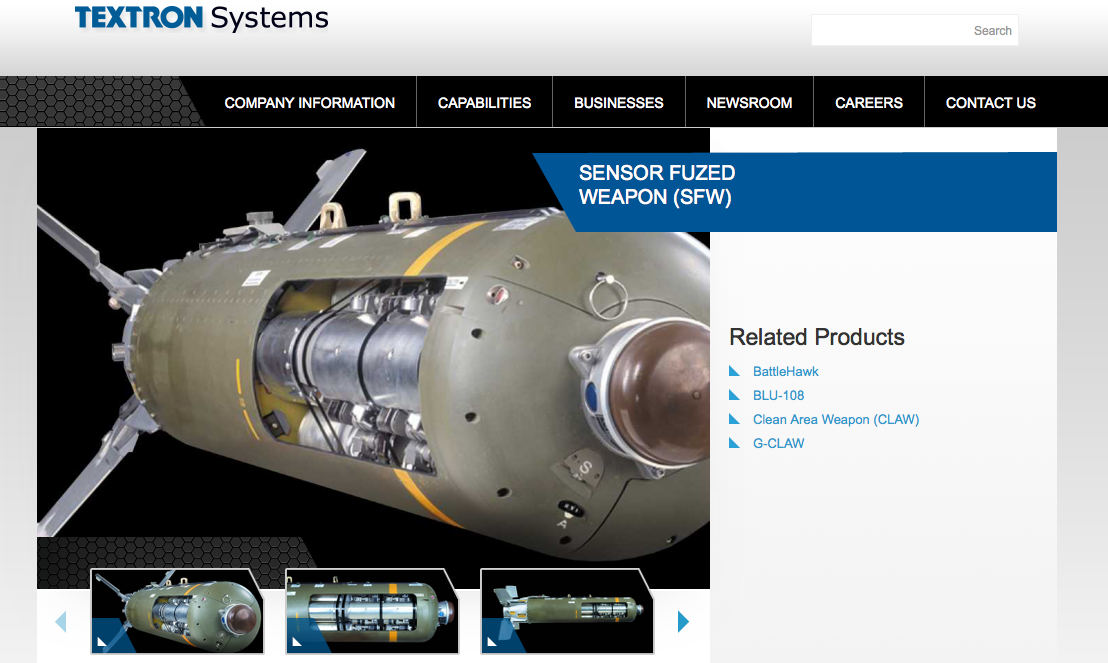 Rhode Island-based Textron sold to Saudi Arabia cluster bombs that, according to a new Human Rights Watch report, “are being used in civilian areas contrary to US export requirements and also appear to be failing to meet the reliability standard required for US export of the weapons.”
Rhode Island-based Textron sold to Saudi Arabia cluster bombs that, according to a new Human Rights Watch report, “are being used in civilian areas contrary to US export requirements and also appear to be failing to meet the reliability standard required for US export of the weapons.”
The CBU-105 Sensor Fuzed Weapons produced by Textron, according to HRW, have been deployed dangerously close to civilian populations as Saudi-led military strikes have targeted Yemen in 2015 and 2016. According to a recent New York Times story, “If confirmed, the report could put new pressure on the United States over support for its ally Saudi Arabia in the Yemen conflict.”
The report alleges several Yemeni civilians have been injured by malfunctioning cluster bombs. HRW and 118 nations oppose any use of cluster bombs in general, but the report says these weapons in particular are malfunctioning.
“While any use of any type of cluster munition should be condemned, there are two additional disturbing aspects to the use of CBU-105 Sensor Fuzed Weapons in Yemen,” says the report. “First, US export law prohibits recipients of cluster munitions from using them in populated areas, as the Saudi coalition has clearly been doing. Second, US export law only allows the transfer of cluster munitions with a failure rate of less than 1 percent. But it appears that Sensor Fuzed Weapons used in Yemen are not functioning in ways that meet that reliability standard.”
Textron spokesman David Sylvestre confirmed that Textron produced the CBU-105 Sensor Fuzed Weapons.
The bombs passed rigorous inspection before being handed over to the US military for delivery to Saudi Arabia. “No company can put that on a boat and deliver it to a foreign government,” he said, noting that Textron can’t be held liable if the weapon was misused. “We’re not in the plane dropping the bomb. If it was dropped in an area that is perhaps too close to a civilian population, that is not supposed to happen.”
Sylvestre made a point to differentiate the CBU-105 Sensor Fuzed Weapons from what he called “Vietnam-era cluster bombs.” The modern version are “intelligent” and only target tanks, he said. “They are not intended to target human beings at all,” he said. “They are made to target armored-vehicles.”
About half of the weapons Textron produces are sold to governments other than the United States, said Sylvestre. He did not know how much business Textron does with Saudi Arabia, or how much it paid for the Sensor Fuzed Weapons. A recent report from the Congressional Research Service says Saudi Arabia spent more than $100 billion since 2010 on US military equipment and training.
“It’s an important program for us,” Sylvestre said.
Headquartered in Providence, Textron employs about 300 people in Rhode Island and has more than 34,000 employees across the globe. The cluster bombs were most likely assembled in Oklahoma while individual parts might be manufactured elsewhere, according to Sylvestre. Textron Systems, a division of Textron Inc. headquartered in Wilmington, Massachusetts, is responsible for the military products, which represent about 11 percent of Textron’s total revenue, Sylvestre said. The company also makes Cessna airplanes, Bell helicopters, golf carts, gas tanks and power tools, among other products. At one time, it owned Gorham, Speidel and A.T. Cross – themselves iconic Rhode Island companies.
Textron started as the Special Yarns Company in Boston in 1923 and the current name is an amalgamation of two early subsidiaries. Sylvestre said Textron first got into the defense industry by manufacturing rip cords used on US military parachutes.
Company founder Royal Little, who lived in a mansion near the town beach in Narragansett, was “the inventor of the modern conglomerate,” according to his obituary in the New York Times.
“Mr. Little made industrial history by taking Textron Inc., which was deeply rooted in the textile industry, and grafting onto it a thicket of small companies that turned out diverse products like ball bearings, gas meters, golf carts, helicopters, metal-working machines, radar antennas, screws and snowmobiles,” says his obituary. “Mr. Little’s skill at acquisitions so outshone those of his competitors that he became famous, as Dun’s Review put it, as ‘the man who started the whole conglomerate movement.'”

